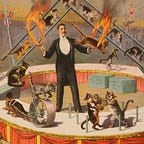Women in Museums
I think (hope?) most people accept that women face certain challenges in the workplace more often than men. I’ve been thinking about this a lot in the museum field, as I’ve recently had a number of conversations that have driven this home. Here, appropriately anonymized, are some of the things I’ve heard from women who do or used to work in cultural heritage organizations. They are all real, and were either shared with me in direct conversation or are things I’ve personally experienced.
One woman found herself astonished at being in a room full of powerful men who were listening to her and actually seemed to want her advice. This was not something she’d experienced at her prior cultural heritage workplace.
One woman found herself experiencing imposter syndrome during a job search, even though other female colleagues reassured her that she clearly had the experience and expertise the job postings were asking for, and then some.
One woman doesn’t feel she can say “no” to requests at her cultural institution, even if they are not reasonable.
One woman’s male interim manager immediately bonded with her male colleague (at the same level as her in the hierarchy), and now that male colleague is the de facto team representative in all cross-functional meetings and the default go-to for the manager. There was no discussion about why this decision was made, or even any acknowledgement that it was a decision that had in fact been made.
One woman who now consults at $100+/hour was offered a $15/hour museum job.
One woman was in a meeting with colleagues as well as external partners when her male boss took credit for something she suggested. Another female colleague later told her that was not the first time she’d heard of that happening with that manager.
One woman had a male senior leader at her former institution lean over her so closely that she had to take a step back. (That leader is still at that institution, though the woman has moved on.)
Every single one of these conversations and occurrences took place within the last three weeks. They represent women of a variety of ages and career stages, and a gamut of cultural institutions. They don’t even touch on the also intensely sticky issue of whether museums appropriately represent women in their collections, exhibits, and programming (which, for the most part, they do not)— this relates only to how they treat their female workforce.
So, what can we make of this? Are museums inherently more terrible places for women to work, or do they just come with a different set of issues for women than for-profit workplaces? Do museums care about these women’s stories? Do they believe these women? Do museums make it safe for women to share such stories, or do the women resolve the situation by moving on? (Moving on was a running theme in many of these conversations — or was something the women had already done. But voting with one’s feet doesn’t solve the underlying issues, except for that one woman.)
So much about the way museums work needs to be rethought, if not totally burned down and rebuilt…. But when and how will we tackle this? And how many women will leave the field they love altogether before that happens? I have many questions, many concerns, and no answers. But I send love and support to any woman who sees herself in these stories, and to all the women who shared them with me.
